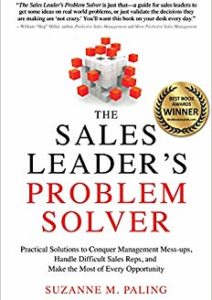What differentiates a solid sales leader from a highly effective sales leader? Effective sales leaders spend more time and place greater focus on the salesperson’s strengths rather than their weaknesses.
These effective leaders:
- make reps aware of their strengths (some reps have no idea)
- speak to the rep in very specific terms
- ask questions
- learn how they can be of more help
- invest in the rep
- provide a way to share these strengths with others on the sales team
Bring Awareness
A sales leader managing a rep who always surpasses quota might say something like, “Tom, quarter after quarter, you exceed your goal. No one on the sales staff is as consistent as you are. As the leader of this team, I really appreciate this contribution to the overall quota.”
Be Specific
Effective leaders focus on a rep’s strengths by adding details. In this case a sales manager could focus on the numbers. “Tom, sometimes you’re at 7% and other times at 20%. On average, you come in at 10% over quota — every single month. That’s not easy to do. I applaud that effort.”
Get Curious
Managers focusing on strengths ask questions such as:
- Were you aware of being the most consistent rep in the group?
- In past positions did you exceed quota routinely?
- How did you develop this skill?
- Did you have a mentor?
- What do you do to ensure you exceed your number every time?
Ask Questions
Having many responsibilities (and other reps) to worry about, a lot of managers would coast with a salesperson like Tom, leaving them to their own devices. Those focusing on strengths do the opposite. They ask:
- What are your goals for the coming year?
- What would you like to work on?
- How can I be the most help to you?
- How should we spend our one-on-one time most effectively?
Together with the rep, they develop a plan.
Learn More
When asked what they’d like to work on, reps often surprise their managers with their answers. Tom says, “Exceeding quota by 7% or less makes me feel like I failed. To me, that’s really just making quota. I want to exceed my numbers by 15% or more at minimum.”
Tom went on to say that while he thinks his product knowledge is strong, his product demo could use some work. He doesn’t exactly know what to do. If he improved his demo, he knows more proposals and closed sales would follow.
Make the Investment
At this point, an effective leader works with the rep to develop a plan. They agree that Tom will research presentation courses and sign up for one. Several times each week, the manager will listen in on Tom’s product demo. During their one-one-one meetings, they’ll focus the discussion on potential improvements.
The manager adds, “Tom, I think Karen gives the best demo of any rep on the team. I’d like you to observe her at least twice this week. I’ll discuss this with her and get back to you.”
Share Strengths
Reps appreciate time and attention from their managers. At the same time, they learn a great deal from their peers. Managers focusing on strengths, allow reps particularly adept at certain skills to share their talents with others.
A manager might say, “Tom, Karen and Jack struggle with hitting quota on a regular basis. Would you mind talking to them? Could you share some of the techniques you shared with me? Coming from you, I know they’d welcome some feedback.”
Final Thoughts
Even the best reps struggle with certain aspects of the sales cycle. Sales leaders must identify, address and minimize these issues, providing coaching and corrective action. It’s a critical part of the job.
The most effective sales leaders know that when a rep already excels at a particular skill, time, attention and focused coaching in that area bring a greater return on investment.












